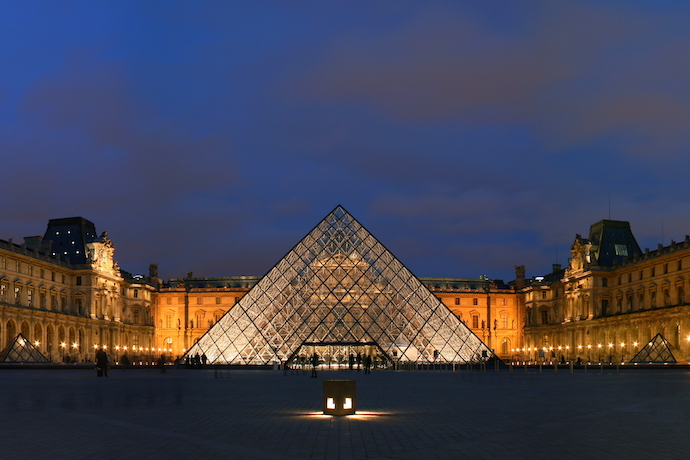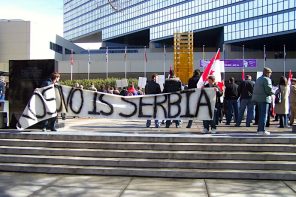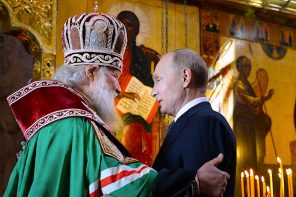This week has not been a very good one for the arts. Or history. The very same week President Trump announced that he was, once again, trying to eliminate funding for the National Endowment for the Arts, the Bulgarian Minister of Culture, Boil Banov, announced that his office would put a stop to an exhibition of Bulgarian religious artifacts set to go on display at the Louvre in Paris this June.
Banov’s announcement followed objections from the Episcopal Synod of the Bulgarian Orthodox Church (the country’s highest religious body) and nationalists from Bulgaria’s ruling right-wing coalition, all of whom were concerned that the exhibition, entitled ‘Art and Culture in Bulgaria between the 16th and 18th Centuries,’ would take place in the Louvre’s wing devoted to Islamic art. Church officials announced earlier Monday that they would not loan those objects promised for the exhibition which were in Church custody.
Bulgaria, like many other parts of the Orthodox Christian world, was part of the majority-Muslim Ottoman Empire for most of the early modern period. The exhibition was meant to highlight the influence of contact between Christianity and Islam on Christian art, the suggestion of which offended Bulgarian nationalists so deeply that it led to the Cultural Ministry’s refusal to loan the sixty previously promised items.
Speaking to Bulgarian state television, Emmanuil Mutafov a historian and the director of the Institute for the Study of Arts at the Bulgarian Academy of Sciences, said, “The influence of Islam over Christianity in Bulgaria was indirect, sporadic, and limited.” Mutafov then doubled down on this idea in a statement posted on the Institute of Art Studies website claiming that the influence was “almost nonexistent” and took place on “a purely decorative level.”
Mutafov’s position on the issue of Islamic influence on Christian art during the Ottoman period is far from a universal one among experts. Of course, the utter unwillingness of government officials, churchmen, and the scholars involved to engage with this legitimate and complex historical question speaks to the chilling effects of nationalism on precisely this kind of intellectual and cultural inquiry—a persistent problem at a time when authoritarian nationalism is on the march across the globe. However, the particulars of this controversy also speak to a unique feature of the new Orthodox nationalism and the distinct brand of cultural conservatism that Russia in particular has branded for export around the world.
When Samuel P. Huntington first published his influential and controversial Clash of Civilizations and the Remaking of the World Order, he not only claimed that Islam posed a threat to “Western Civilization,” but he included Orthodox Christian civilization in that category as well. Yet it’s only been in the past decade, as a result of the alliance between Vladimir Putin and Patriarch Kyril of Moscow, that Orthodox Christianity has been reinvented in the Western mind as not only part and parcel of the Christian civilization of the West, but as its sole modern defender; the last holdout of Christendom in the face of an increasingly secularized and immoral Western world. Putin has even proposed that Orthodox Russia is a “bastion of traditional values” that can and must serve as a “moral counterweight” to the United States.
Though born in Russia, this view of Orthodoxy is now an integral part of nationalist movements in many traditionally Orthodox countries, including Bulgaria. It’s a view of Orthodox history and culture, however, that’s only sustainable if (and truly only if) one discounts Orthodoxy’s long engagement with Islamic civilization, its complex history with Western Christendom, and even the very recent period of nearly seventy years spent behind the curtain of atheistic communism. It’s a view of Orthodoxy that’s only sustainable if Orthodoxy is treated as static and ahistorical. It requires history to be erased.
And that is the real danger of the Bulgarian Ministry of Culture’s decision. The problem isn’t a single art exhibition being cancelled at one of the world’s great museums. Rather, the frightening fact is that this represents yet another example in a flood of such instances in which the new nationalism seeks to erase history and manipulate the culture—even at its highest levels. Because the new nationalism cannot abide by the messiness of that history or the complexity of culture. And that is a problem for us all.
While the United States may not be quite as far along in its march toward nationalist amnesia, destruction of the NEA and NEH have long been on the to-do list of America’s cultural conservatives for the very same reasons that the Bulgarian Cultural Ministry refuses to turn over its artifacts into the able hands of the Louvre’s curators. But it does seem decidedly more sinister when it’s proposed by a Trump White House whose relationship with the truth of even the present moment is tenuous at best.
And our relationship with the past is very much about our place in the present. One of the things that people—particularly those with strident minds—dislike about history (and art for that matter) is that it is so vast, so diverse, and so wild that if you dig around long enough there will inevitably be something that challenges your most fundamental beliefs. The authoritarian mind craves purity, yet art and history are anything but pure. It’s neither convenient nor pleasant for Bulgarian nationalists, or for Orthodox Christians more generally, to admit that the long night of “Turkish occupation” (as I was taught to call it as a child) left even the slightest mark upon their culture, let alone their religious art. But that is simply not the messy truth.
Of course prolonged contact leaves an impression. We are molded by both our friends and enemies. Using the brute power of the state to silence scholars and artists does nothing to change that. And one lesson of history is that, in fact, the truth almost always comes out. Eventually, anyway. Those who would try to hide it in Sofia—or in Washington—would do well to remember that.





